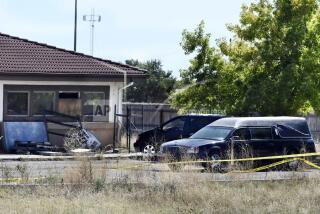Big Companies, Simpler Services Typify Funeral Industry’s Reincarnation : Chains Avoid Mass Market Feel as They Step Up Acquisitions
- Share via
METAIRIE, La. — The business of burial, long the exclusive province of family-owned funeral homes, is undergoing a quiet revolution in the United States with the acquisition of hundreds of homes and cemeteries by chain operators.
*
And the movement is quickly spreading overseas, where funeral services traditionally cost a fraction of those in the U.S.
Service Corp. International, the world’s largest funeral home network, announced a $423 million deal in July to add 950 European funeral homes and cemeteries to the 1,807 it currently owns.
Houston-based SCI is not alone. Stewart Enterprises Inc., based in suburban New Orleans, has moved into Puerto Rico, Mexico and Australia. Ranked No. 3 in size in the industry, Stewart now has 153 funeral homes and 104 cemeteries.
“It’s a good industry to be in,” said Joseph P. Henican III, Stewart’s chief executive officer. “It’s stable and non-cyclical.”
Other major players include Canadian-based Loewen Group, which is No. 2 in the industry with 764 funeral homes and 162 cemeteries in the U.S. and Canada, plus a handful in Puerto Rico and Mexico; and Lufkin, Texas-based Equity Corp. International, which ranks fourth with 104 funeral homes and 53 cemeteries.
But people seeking funeral services are not likely to recognize chain funeral homes unless they are specifically looking for them. The homes are largely keeping their previous, well-known local names, and their managers--in many cases, members of the selling family.
“We believe that local management can operate a funeral home better than a company office,” said Al Lineberry Jr. a Loewen regional vice president whose family sold its four funeral homes in the Greensboro, N.C., area several years ago.
Chains are centered on two strategies: having combined funeral homes at cemeteries at the same site and the centralized sale of prearranged funerals, touted to buyers as a way of conveniently arranging services and locking in prices against inflation.
Duplication of services in the labor-intensive business is cut: SCI uses one embalming facility to serve its 15 funeral homes in the Houston area. One sales staff can tout prearranged funerals for many homes and cemeteries.
Stewart’s funeral homes generate an average of 350 services each per year, compared with the national average of 150. Idle time for staff members is cut, along with costs per funeral.
“The economies that result from that make it the wave of the future,” Henican said.
Many officials of the big companies insist there is no intention to package funerals like Big Macs. They point out that many acquired homes have traditionally served specific religious and ethnic communities, and funeral buyers expect to be treated in a traditional manner set down for generations by family-owned homes.
Because of a pending securities offering, SCI officials said they could not talk about their business. As of June 30, SCI held 9% of the funeral industry in North America, 15% in Great Britain and 20% in Australia.
But in a 1993 interview with the New York Times, SCI founder and chairman Robert L. Waltrip did not resist comparisons to mass marketers.
“The hamburger business used to be solely a Mom-and-Pop hamburger stand,” he said. “Now you go to McDonald’s or Burger King and everybody’s in a uniform. All the cooking is computerized and all the order-taking is computerized.”
“There is nothing amazing about trying to bring that to an industry that never had that before,” Waltrip said.
Although only 8% of the domestic funeral market is consolidated into chains, such companies are better prepared to take advantage of industry changes, according to a recent analysis of Stewart by the investment firm Goldman Sachs.
The trend toward combined funeral homes-cemeteries, prearranged funerals and cremations, along with cost-containment demands by consumers, is putting more financial pressure on smaller operators, the analysis said.
Many family operators face another problem: Their children often have no interest in the funeral business.
“The family business is not perpetuated because there is no family member who can take over,” Lineberry said. It’s easier for a family-owned business to be sold to a chain operator.
Overseas, chains hope customers will be receptive to more expensive services and products such as caskets. Funeral costs in Britain and Australia run about a third of the cost of U.S. services.
Equity Corp. has struck out on a different line from the top three, focusing on smaller markets. The company was formed in 1990 when SCI, deciding to concentrate on urban areas, sold 71 properties in non-urban areas.
Equity is centered in communities with populations of 10,000 to 100,000, or Main Street U.S.A. as company president James P. Hunter III calls it.
“Small-town funeral directors tend to be leaders in their community. It’s our mission to preserve that type of personalized care. It requires a different mind-set than the metropolitan operator has,” Hunter said.
Hunter said about 16% of funeral industry revenue is now in the hands of consolidated operators. He expects that figure to grow to 40% over the next decade as mini-regional companies join the larger companies in competing for acquisitions.
Are the small, independent operators endangered? Ruth Ohde, whose family has run Ohde Funeral Home in Manning, Iowa, since 1905, doesn’t believe so.
Some small funeral homes are now forming cooperatives to cut their own costs, sharing such high-expense items as limousines, hearses and carriages, and buying embalming supplies together, she said.
But whether a funeral home is independent, or one in a chain of hundreds, service--and not cost-cutting--is still the customer’s primary concern, Ohde said.
“I think it gets down to service and personality, a desire to serve families,” she said.
More to Read
Inside the business of entertainment
The Wide Shot brings you news, analysis and insights on everything from streaming wars to production — and what it all means for the future.
You may occasionally receive promotional content from the Los Angeles Times.










